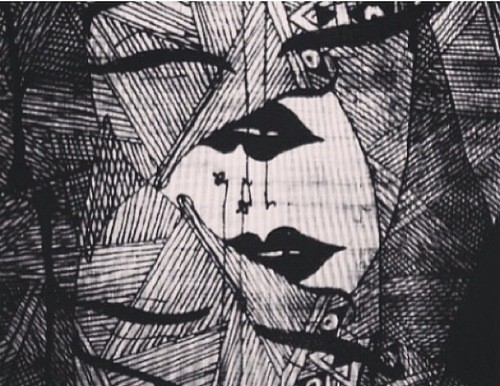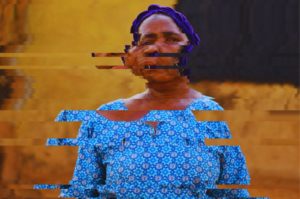Sleep stays away at night. In the morning strangers visit me.
For most of the day there is just the fever, hot and angry-coloured. The clock on the table says 3:05 p.m. I have been sprawled on the bed for two days; my head cannot lift from the pillow.
The table vibrates. My phone is ringing and for a while I try to make out what to do in response. The action slips through my mind like sand from my fingers. From downstairs the radio goes silent.
A woman’s voice comes on, clear and mellow, confirming the time, assuring us that the music will continue here on Niger Delta Radio after a brief commercial break. There is a jingle for a play showing at the Civic Centre on Friday, then a commercial for anti-malaria tablets. The bed creaks as I turn on my side.
A man walks in, tall as the door. There is sweat on his forehead, softness in his bloodshot eyes, a black pen clipped to his breast pocket. I hurt my throat to say the name. Papa? Did I just call him Papa?
He sits on the bed, the back of his hand on my cheek, then gets up to draw the curtain. When he returns he holds my mouth open, places something on my tongue, and makes me take a drink from a cup. His lips move, but I don’t get the words. There is a wet napkin on my forehead. I want to take his hand and put it right under my arm, in my armpit, so he can feel the burning.
But now the shivering has stopped. Gathered itself and lifted. For a moment it hung over me like a hat; now it sits on top the wardrobe at the end of the room, grinning. Like a naughty girl in a short skirt. I feel it moving to the window. But what is there to see?
There is the bungalow just behind us, and a blue plastic water tank standing over it. Across the road, more bungalows, all close together—cream-colored, solid, metal bars on their windows, each with a fence and gate of its own. The new zinc of the bole woman’s shed catching and hurling back the sun. The woman herself roasting fish and plantain in pepper sauce for the motor mechanics. The high-tension electric pole in front of them covered with posters.
MIRACLE CRUSADES
—invite, for a Night of Encounter and of vanquishing the powers of poverty and sickness, of destroying untimely death; of obtaining divine favour to secure jobs, a husband, wife; for bringing an end to miscarriages—
Put an end to near-success syndrome in business—
Vote for Accountability & Sustainable Development, for Transparency & “No” to Nepotism, for Democratic—
Just ahead, by the road, there is a tree.
And right now, as if the stage has just been set for them, three birds, weavers, whiz across the path, perch on the tree branch, and begin to chirrup my name. Two, three, four times they say it, and then they pause to argue among themselves. The two older weavers say to the younger one, Have you got a cold? Or is this your usual tone? Because it is terrible, terrible. They shudder. You must look and learn. Hold your neck up. Flatten that tongue for a perfect O.
But the young weaver doesn’t let them finish. He flaps a wing, straightens his neck, and tells them quite clearly he doesn’t give a fuck.
Before they can respond they are startled by the chattering of two girls in worn chequered pinafores, swinging loaded cellophane bags in their hands; house helps returning from an afternoon errand. Out in the open, Tiger the mongrel is sprawled on the sand, dozing, totally baffled in the heat. Occasionally one of his ears will flicker involuntarily. Flies perch on his face anyway.
By the corner, a black hen is scratching the earth frantically for worms. Two weeks ago the rain carried away four of her newly hatched chicks, leaving her with only one. Yesterday a hawk swept down and snatched it. The hen put up a tough fight, flew after the hawk, far above the bungalow’s roof, shrieking and flapping and causing much uproar, but in the end the hawk was a hawk and she was a hen. Today she is stranded in old habits, walking the same old paths alone, scratching and cooing to her lost children. Only occasionally does a trembling take her, and even then she doesn’t give in. She is private, solemn, restrained. There is dignity in her grief.
In my head, meanwhile, the headache subsides. The relief is so unbearably pleasant that the curtains begin to wriggle their waists. I doze off and am at once ushered into a benevolent nightmare in which purple colours wage war against octopuses in the River Orashi, far off at the throat of the Atlantic.
I wake to the steady shifting of the afternoon. My tongue is clammy and bitter.
And still, there is the wardrobe, the clock, the table and the fan on the ceiling that keeps spinning round and round. There is the bungalow, the water tank, the poles, the ripped old posters and the tree at the road. There is the echo of voices of the girls returning, the tinkering of the mechanics, wood smoke from the bole woman and the dog sprawled in the sand. There is me on a bed, feverish. And now there is a young woman who has appeared before me, midnight and full-breasted.
She is singing to me in Italian.
This short story was first published in McSweeeney’s.
Image by Algerian-Bulgarian artist, Meryem Meg. See more HERE.










Chimdi June 11, 2014 02:27
Nice one boy. Keep up the good work